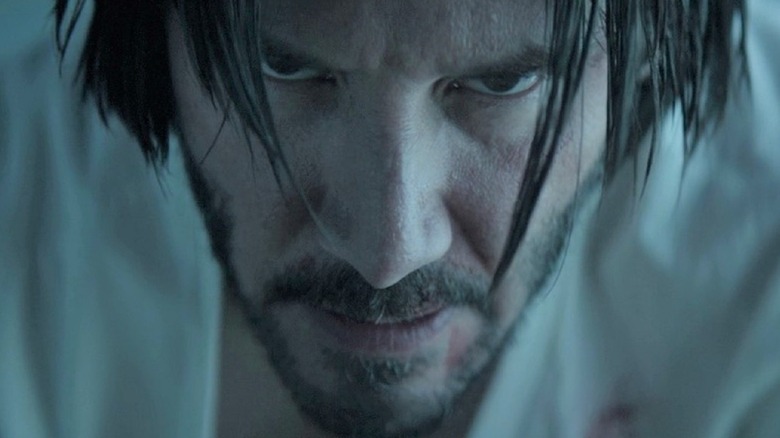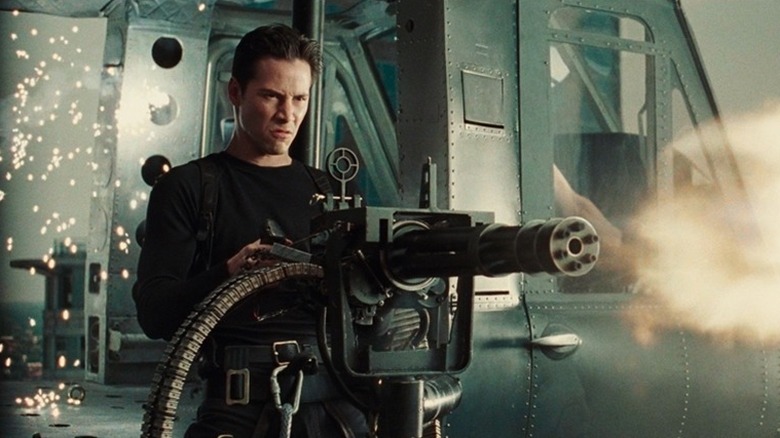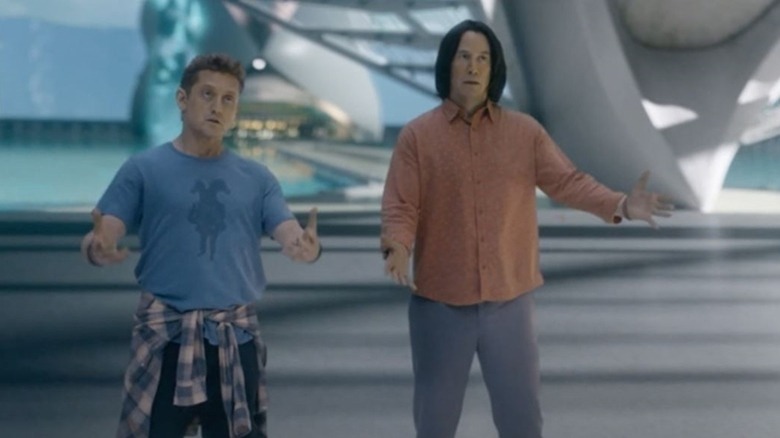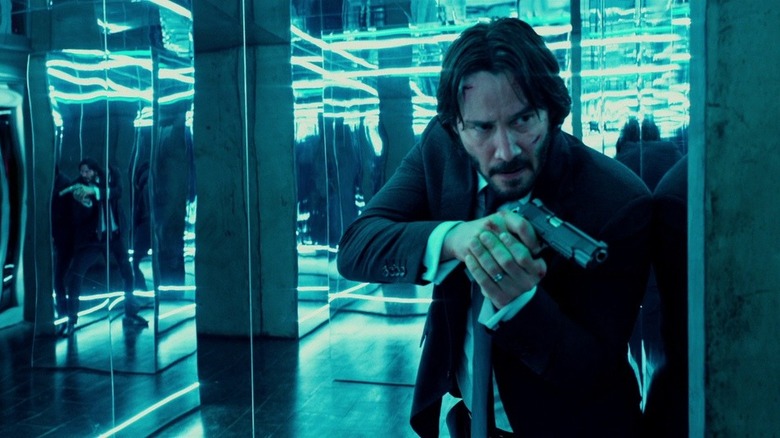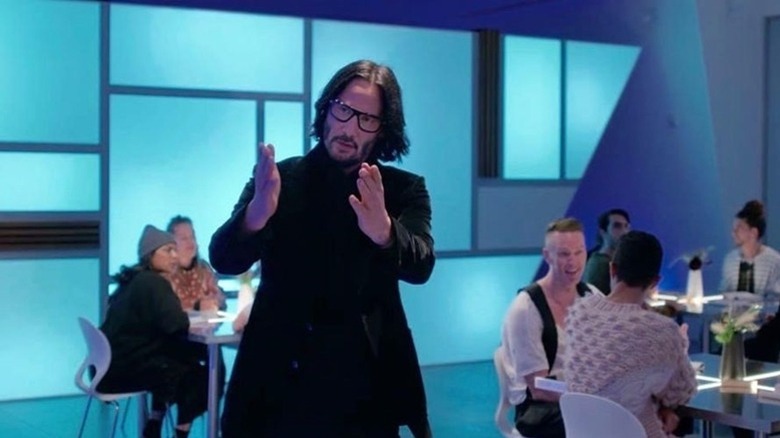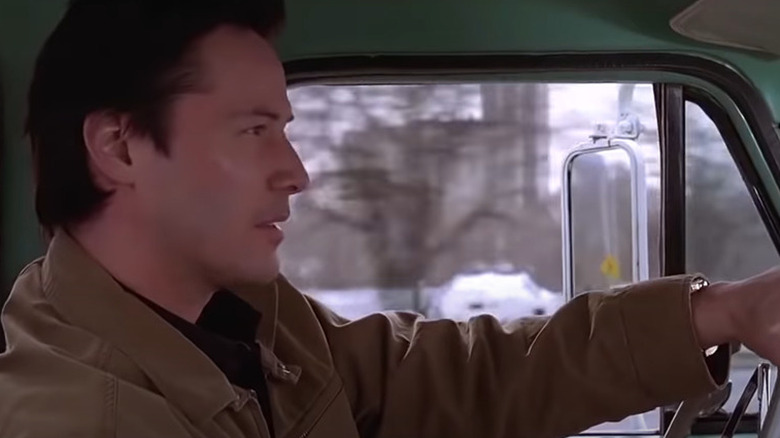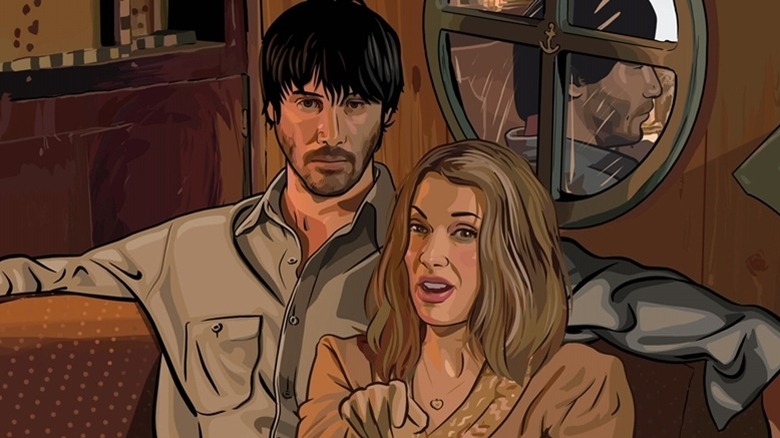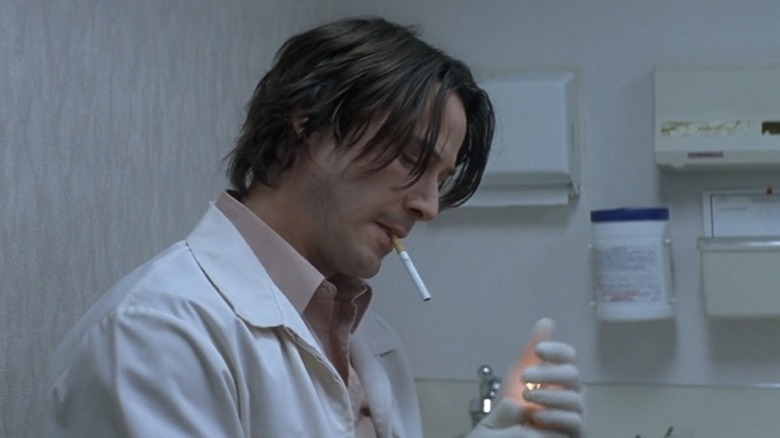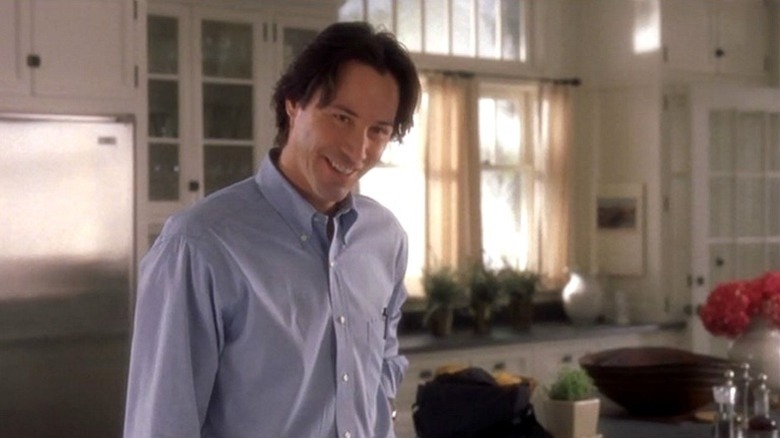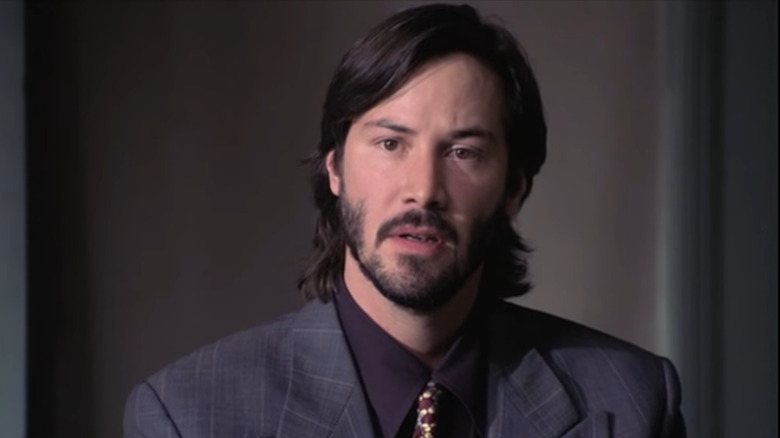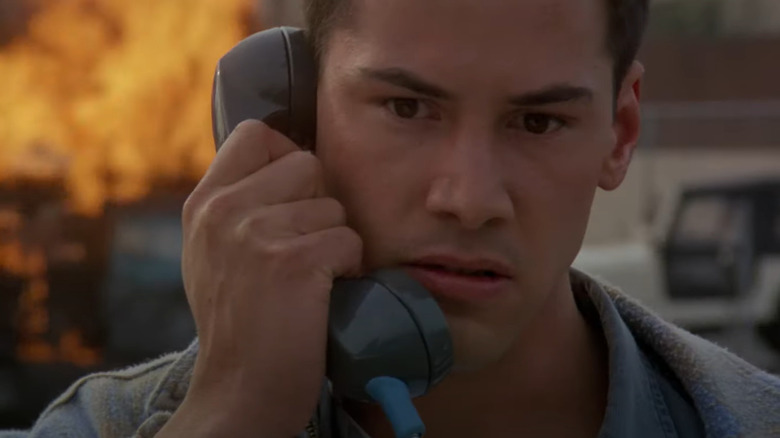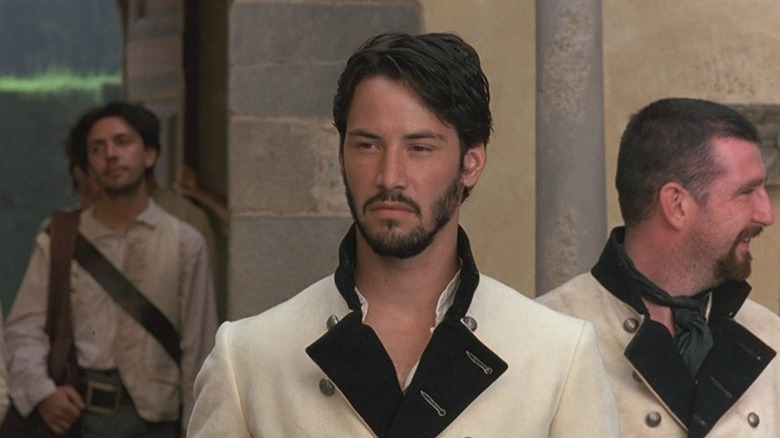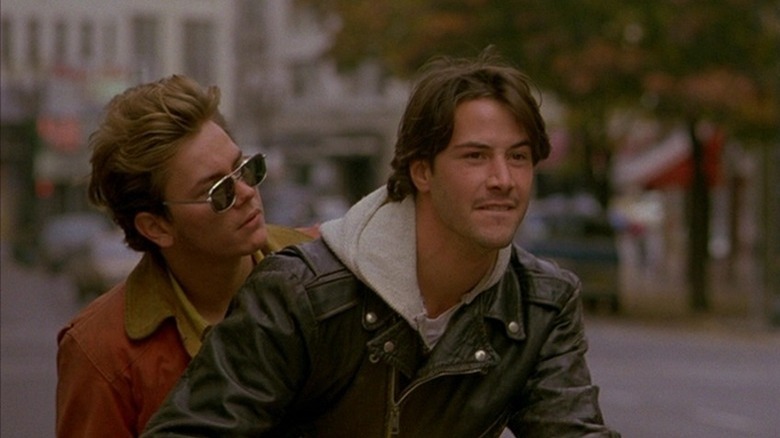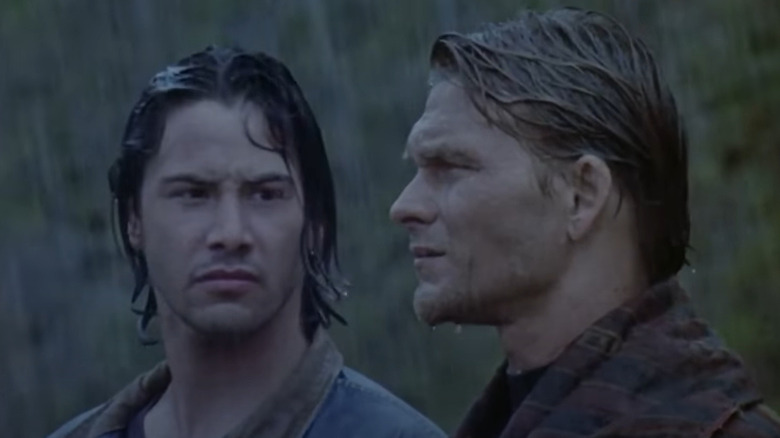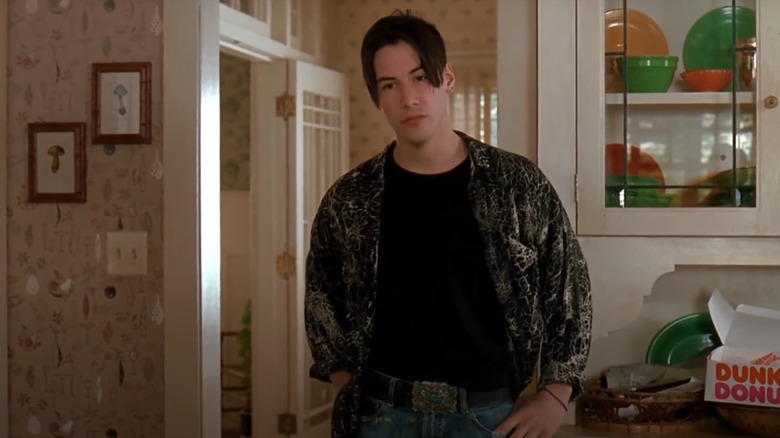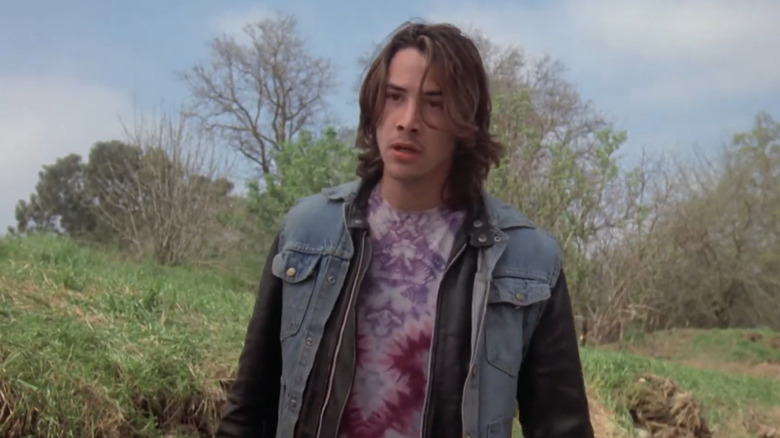The Best Characters Keanu Reeves Has Ever Played
Throughout his career, Keanu Reeves has watched the pendulum swing to and fro regarding the conventional wisdom about his talents. Early on, critics praised him for strong naturalistic performances. Later, he was mocked for his "serious" voice and perceived artificiality. Now, thankfully and correctly, critics and fans alike have returned to recognizing the man's talents.
Part of this is maturation, no doubt. From the start, Reeves was an actor who sought challenges. In the past decade or so, that hasn't gone away. However, his choice of projects seems to have improved. He more consistently picks roles and films that provide creative risk while still playing to his strengths.
But the more significant part is that time has proven Reeves right. The fabric of modern pop culture has captured and spotlighted several of his roles. They are iconic performances that no one else could've rendered the same way. Perhaps some other actor would still have done justice to a time-traveling slacker, an unstoppable assassin, and high-speed cop, but all three? Seems less likely. And even if they did, they still would be different than what Reeves did with those characters.
During this period of critical and fan appreciation, it's a great time to get on board. So let's take a look at the best characters Keanu Reeves has ever played.
Neo in The Matrix franchise
Mr. Anderson presents an interesting acting challenge. To play him from the "The Matrix" through its subsequent sequels, an actor needs to depict frustration, anger, confidence, confusion, sadness, inner peace, dissociation, and longing. But the actor also needs to keep these emotions slow, as if Neo were experiencing them through a pane of glass.
In other words, no one but Reeves could've realized the character so perfectly.
Reeves hooks into the idea that, given who Neo is, he often feels separated from his emotions even when he's unaware that he lives in a simulation. He has them still, but they always feel a bit alien, as though he's experiencing someone's feelings for them. When finally "awakened," he still often seems emotionally removed from himself. However, this reflects both the trauma of finding out the whole of existence as you know it is a lie and Neo's role in both worlds. When he's jacked in, he can see the code of the false universe. When he's outside the simulation, his life is still defined by what he must do in the program. Reeves navigates that sense of being divided without ever losing Neo's humanity.
Theodore 'Ted' Logan in the Bill & Ted series
The thing about Theodore "Ted" Logan is that beneath all the jokes, running around, and air guitar-playing, he's both a fundamentally good person and a bit of a sad, scared one too. And Keanu Reeves connects with the outwardly gregarious and the inwardly sweet but melancholy sides with equal ease.
It's a complicated formula to make work. Too much silliness and Ted ends up a stoner cartoon, someone you laugh at, not with, and certainly not someone you hope succeeds. Too far in the other direction and you have a Ted who's too much of a downer to shred as one half of the party happy Wyld Stallyns. But Reeves performs that alchemy with such finesse that not only do some people assume it was easy, but they assume Ted is Keanu and vice versa.
His chemistry with Alex Winters as Bill is also otherworldly. The two count each other as real-life friends, but everything about their performances on-screen suggests they've known each other for a lifetime. Their dialogue in its give and take doesn't feel rehearsed so much as it feels like something they've done for years. It isn't stale; it's lived-in in the best possible way.
John Wick in the John Wick franchise
If you need one specific role to point to as the moment public opinion changed on Reeves' acting, it almost certainly has to be John Wick. Praise and excitement certainly met characters like Neo along the way, but one could feel the earth shift when "John Wick" came out.
Like "The Matrix" films, the installments in the "Wick" series are perfectly suited to how Reeves expresses sadness. Even in his breakdowns, he is a silent sufferer, and these films capture that well. He's also a slow sufferer, which Reeves lets play across his eyes even in Wick's angriest, most vengeful moments.
The "I'm thinking I'm back" line is iconic because it is excellent — wonderfully timed, well-delivered, and smartly written. It's Wick at his most coiled dangerous. However, Reeves lets the anguish of "being back" move across the assassin's features even at that moment. It's a badass scene, for sure, but he never lets it be only that. He never lets us forget what it cost him to be this badass.
Himself in Always Be My Maybe
The celebrity cameo as joke is a well-worn trope in film and television, so much so that it often tickles without really delivering memorable laughs. In other words, celebrities playing themselves is a deceptively tricky task. For the shining example of a cameo done right, check out "Always Be My Maybe."
Keanu Reeves does it fantastically in this charming romantic comedy. Even though he plays a heightened, awful version of himself, there's always an element of the actual guy in there. Even as the night escalates to obvious farce, there's an aspect of Reeves' worst self that never leaps into an unbelievable space.
He does this by heightening the aspects of himself we already know (or think we do). There's the zen master philosophizing, the popularity of his public persona, and the vague sense of extremity he sometimes gives off despite famously being a fairly low-key on-set presence. He also skews his "real-life" self in delightfully weird ways. He's not just a greedy, entitled monster in this film. There's a specificity to his peccadillos that make his fictionalized "Keanu" so much stranger and funnier than more typical approaches to the trope.
Alex Wyler in The Lake House
One of the genres that Reeves has arguably struggled with the most is romances. He has a slow, easy charisma, but that energy has often been misaligned in love-centric pictures. But in "The Lake House" — a high-concept romance involving letters that magically travel through time via a special box — he finds the right fit.
Certainly part of it is that he and Sandra Bullock already had a proven chemistry when they signed on for this film. What was discovered in "Speed," they brought to bear here despite existing on different points in the timeline.
While chemistry will get viewers a lot of the way there, that's not the only reason to recommend Reeves here. There's a sadness at the core of Alex that the actor captures without letting it upset the film's central preoccupation. The way Kate's (Bullock) letters reinvigorate him makes their romance so much richer because of the low ebb of depression he establishes so well in the early-going. Without it, "The Lake House" would be a cute enough film. With it, however, the picture gains an extra bit of resonance.
Bob Arctor in A Scanner Darkly
A dystopian look at a War on Drugs long after the battle's already lost, Reeves plays the era's equivalent on an undercover cop. Addicted to Substance D, the super drug of the moment, Bob Arctor struggles with his increasingly complicated existence and his increasingly damaged cognitive processing.
The film utilizes rotoscoping to give the visuals an animated feel. Additionally, Arctor uses a constantly shifting disguise to protect his identity when he's not in the field. All of this means that Reeves has to rely on his voice significantly more than usual to convey everything about his character's journey.
It's a tall task, but the actor delivers. Viewers can chart Arctor's decline throughout the film using Reeves's tone and pacing. The sense of higher powers offering him up as a sacrifice to this failed endeavor grows more acute as the film progresses, right up until the final scene. The final moment of "A Scanner Darkly" is especially painful, although Reeves makes it ambiguous enough. Viewers are left to ponder if they've watched the final break of this man's life or a lingering ray of hope.
Perry Lyman in Thumbsucker
At one point in the 2005 dramedy "Thumbsucker," Keanu Reeves apologizes for using "hippie psychobabble." It could ring out as a groaner of a meta-joke. After all, Reeves has gained himself a reputation for being something of a zen philosopher. While he doesn't speak in koans, he often does drop bon mots that seem just this side of those mediational phrases. However, as Dr. Perry Lyman, the actor delivers the line straight, without a hint of irony.
Lyman is, in many ways, a natural fit for Reeves. While most have probably never looked at the actor and thought, "I bet he'd make a good orthodontist," Reeves never sticks out like a sore thumb (pun not intended but also not apologized for). The actor makes it make sense that Lyman would be the one adult that protagonist Justin (Lou Pucci) trusts to help him break his thumbsucking habit. He's a character overflowing with genuine kindness.
He's one of the few people in the movie who's honest about his own shortcomings. More importantly, he's one of the few who accepts Justin as is without insisting the lead never change.
Julian Mercer in Something's Gotta Give
Being the stable, intelligent, kind guy destined to lose in a romantic comedy is a thankless gig. This particular sad sack is usually a perfectly decent person who viewers nonetheless want out of the way so the film can give us the kind of grand romantic gesture we all crave.
Keanu Reeves plays this exact person in "Something's Gotta Give," destined to lose to Jack Nicholson, the other — arguably more age-appropriate — suitor vying for Diane Keaton's playwright's heart. Even in 2003, when Nicholson retained plenty of rakish appeal, that a woman would choose him over a 30-something Reeves was difficult to swallow.
Refreshingly, Reeves never tries to convince us that Dr. Julian Mercer is a drip. He has no fatal flaw like a snore or an inconvenient allergy. Julian's a great guy who respects Erica (Keaton), loves her work, and has a seemingly endless well of compassion. He's also charming and genuinely funny. No doubt, much of that is in the writing, but Reeves still breathes it into life. He manages to both be the obviously right guy for Erica and make us believe he'd also be the type to step aside graciously so she could be with Harry (Nicholson) without guilt or a fight.
Donnie Barksdale in The Gift
The number of times Keanu Reeves has been a villain you can count on one hand. And you wouldn't need all your fingers. Seeing "The Gift," it's difficult to understand why.
In the supernatural thriller from writers Billy Bob Thornton and Tom Epperson and director Sam Raimi, the most frightening thing in the swamp isn't local fortune teller Annie Wilson's (Cate Blanchett) visions. Instead, that dubious honor belongs to the all-too-human evil of Donnie Barksdale. Played with barely contained violence and unending selfishness by Reeves, Donnie is absolutely a monster. While twists and turns await, the actor precisely nails the tone to deliver the film's message. This is a story of men who try to control the women in their lives and the ugly, hateful ways they react to those who refuse to recognize their "right" to be in charge. While others do so with condescension and dismissiveness, Barksdale becomes a mad, snarling dog.
Given Reeves's filmography, it's especially interesting that he never attempts to provide Donnie with something behind the eyes. For an actor that typically found the goodness in all his characters, it's clear Reeves makes a conscious choice to present this domestic abuser as empty. He is a man who is exactly what he appears on the surface. There is no secret wound, no "stuck in a cycle of violence" justification. Donnie is a violent beast because that's all he wants to be.
Jack Traven in Speed
While known in 1994, Keanu Reeves still hadn't achieved full-out movie superstar status. "Speed" changed that.
As Officer Jack Traven, Reeves crafts a no-nonsense kind of action hero. Despite the villainous Howard Payne's (Dennis Hopper) insistence on calling Jack "hotshot," Reeves made him anything but. From his haircut to his demeanor to his physique, the character rejects the bodybuilder action star aesthetic and attitude that ruled multiplexes for over a decade.
Traven eschews one-liners and bombast for comfort and strategy. It's impossible to imagine the likes of a Arnold Schwarzenegger leaping onto that speeding bus and giving the hostages the same sense of calm Reeves does as Jack. His energy also serves well in contrast to Hopper's tornado of teeth, maniacal glares, and threatening patter. You can almost feel the villain escalate in reaction to Traven's stillness, making their dynamic an unusual instance of the hero refusing to take the bad guy's obvious bait.
Don John in Much Ado About Nothing
Back in the day, one of the criticisms of Keanu Reeves was that when he went serious, he frequently sounded like Ted paraphrasing Shakespeare in "Bill & Ted." Given that, choosing to act in a Shakespearean adaptation seemed a foolhardy effort for the actor. Good thing Reeves decided to make the film instead of accepting assumptions about his skill.
Reeves wasn't unfamiliar with delivering lines in iambic pentameter thanks to his role in "My Private Idaho." However, when he stepped into the part of Don John, he added a subtle, seething unhappiness to his character. As a result, Don John speaks with a halting presentation, suggesting his struggle to finesse everything he says lest he genuinely speak his mind.
Some criticized Reeves at the time for seeming small compared to some of the cast's heavy hitters like Kenneth Branagh and Denzel Washington. But looking back now, it's an excellent choice for the character. The little half-brother of Washington's Don Pedro, Don John has spent years being reduced and shoved to the background. So it's no wonder Reeves performs him as a wounded, entitled younger sibling.
Scott Favor in My Private Idaho
Tackling Gus Van Sant's mashup of William Shakespeare's "Henry" plays and street hustler life was a tremendous risk for any actor. This would've especially been the case for Keanu Reeves and co-star River Phoenix, actors who were both defined, in part, by their matinee idol attractiveness. To subvert that by engaging in implied and graphic (for the time) same-sex couplings could've derailed their careers. Even if Hollywood was more progressive and accepting than much of the country, this was still the early '90s.
However, there's nothing performative in how Reeves handles the Scott Favor role. It feels honest and authentic, never the flex of an actor trying to impress with the risky choices they're making. The chemistry between Reeves and Phoenix is terrific — gentle and sweet — even as Mike (Phoenix) and the audience becomes aware that Scott will never reciprocate the younger man's romantic affections. Reeves builds that foundation of kind connection so well that his eventual rejection of Mike and their other hustler friends doesn't just sting ... it breaks hearts. We can feel the causal cruelty of Scott's choice, but we are also aware of how it tears him up to do it as well.
Johnny Utah in Point Break
Johnny Utah. Is. An. FBI. AGENT!
He is also a very lost boy looking for something, anything, to give him purpose again.
A football star who watched everything go down the drain, Utah, years later, still doesn't seem to have found what to do next. Granted, Keanu Reeves gives him the kind of effortless charisma and physicality we'd expect from a top-shelf quarterback. But he also lets us see where it has chipped and peeled away. Reeves's Utah has momentum but no idea where to direct it.
That's why his infiltration of the Patrick Swayze-led gang of thieves feels so risky. It isn't just that Utah might be found out and thus killed. It's that Reeves makes the FBI agent feel lost enough that you can believe he might switch sides just to feel like he has a direction again. The above-paraphrased line is iconic for much the same reasons. Utah is trying to convey the gravity of the situation to bank robber Bodhi (Swayze), but for all his forcefulness, it sounds very much like a child trying to voice what they need. Reeves made it heartbreakingly clear that Utah is begging Bodhi not to make him do his job.
Tod in Parenthood
The ur-philosopher slacker of Reeves' career, Tod is, at first glance, a parent's nightmare as the new addition to the family. He shows up ... then Helen's (Dianne Wiest) daughter, Julie (Martha Plimpton), drops out of school, gets married to him, and gets pregnant in a matter of weeks.
However, Reeves' interpretation of the character refuses to lapse into a trope. As Helen grows to respect him, so too does the audience. Again, Reeves reveals a core goodness and a historical pain to the character. The result is Tod moves away from being a joke.
On top of that, we also start to see how competent he is despite his often low intellectual presentation. Watching Tod, you can't help but begin to see what makes him a good partner and a good father. He starts as a goof, certainly, but he more than earns his place within his family by the end.
Matt in River's Edge
"River's Edge" is unquestionably a difficult film to watch. Filled with so much apathy that many of the characters border on sociopathic, it depicts how one member of a slacker clique murders someone and explores how that affects — or doesn't affect — the rest of the town.
Reeves' Matt stands out as the sole member of his friend group motivated to go to the authorities with the truth. His actions are a betrayal of his friends, and they also reveal how little such acts of honesty matter. The actor rarely speaks to those realities, but his face gives it away. His body language betrays a sense of defeat even before he goes to the police.
Matt was raised to accept failure — he has for so long that he doesn't just accept it anymore, he expects it. He's a teenager, and in many ways, he's already given up. So have his friends. The ending gives the teens something of an emotional catharsis, but Reeves's performance has already burrowed in too deep. He may have good days, we now realize, but that's the best he'll let himself believe.
